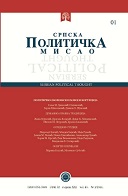ИСКУШЕЊА МЕДИЈСКЕ ТРАНЗИЦИЈЕ
TEMPTATIONS OF MEDIA TRANSITION
Author(s): Rade VeljanovskiSubject(s): Politics / Political Sciences
Published by: Институт за политичке студије
Keywords: Media; transition; market; commercialization; consumerism; concentration; fragmentation; regulation; public interest
Summary/Abstract: The changes that have affected most of the former socialistic countries also include the media field. The transition of media system should be the possibility for getting closer to realization of democratic standards in the public sphere and thereby support of the overall transition and democratization. The main goal, however, is often compromised by problems which are also recognized in developed countries that did not belong to the world of socialism. Occurrences such as commercialization, consumerism, concentration of ownership, the fragmentation of the audience and many other have largely been serious temptations for the transitional media systems. Overemphasizing the market within the neo-liberal conception of development, leads to such phenomena in the media sphere which results in placing business impact, that is profit, before the public interest and promotion of the fundamental values of society. The path which, countries in transition have so far crossed, contains many examples that in these countries the above mentioned problems occur, often with more serious consequences than in more developed countries. The low level of total material development, weak markets, poor media, insufficient implementation of legislation have all enhanced the negative effects of commercialization, concentration or sharing of the audience. The influence of large global and European media groups in markets of transitional countries hasn’t brought, in general, positive effects that have been announced but has mostly contributed to lack of transparency and concentration of ownership, with the dominance of low-quality content. Most of the media supply is a kind of confection of the media industry, standardized, uniformed formats that do not increase but drastically reduce a pluralism of content. Possible solutions for the media systems in transition are careful regulatory intervention with elements of co-regulation, serious democratic and professional control of media activities by regulatory and self-regulatory bodies, systematic social media boost that affirm most important social values, in other words, the consistent application of the rules of modern democratic regulation and self-regulation.
Journal: Српска политичка мисао
- Issue Year: 2014
- Issue No: 1
- Page Range: 235-250
- Page Count: 16

